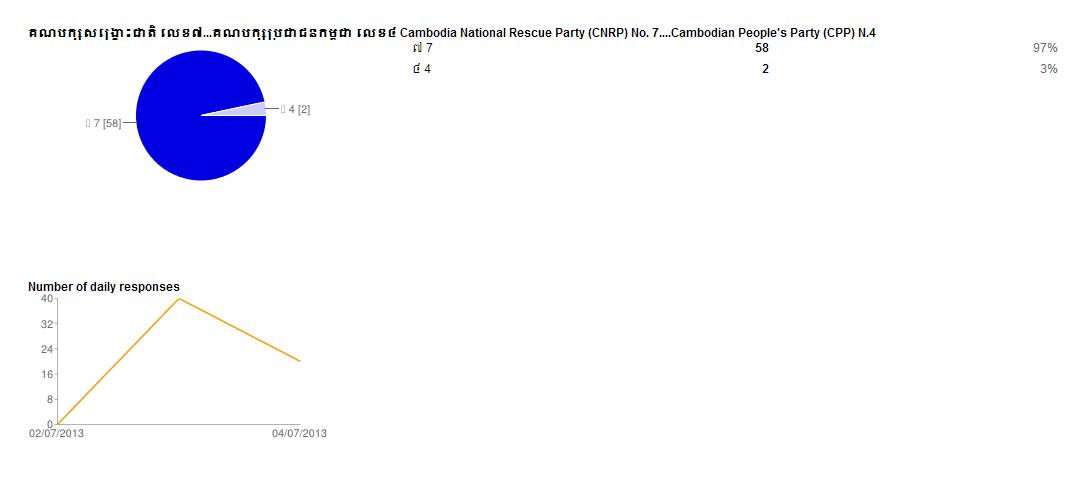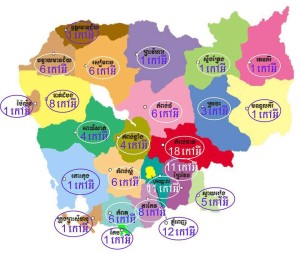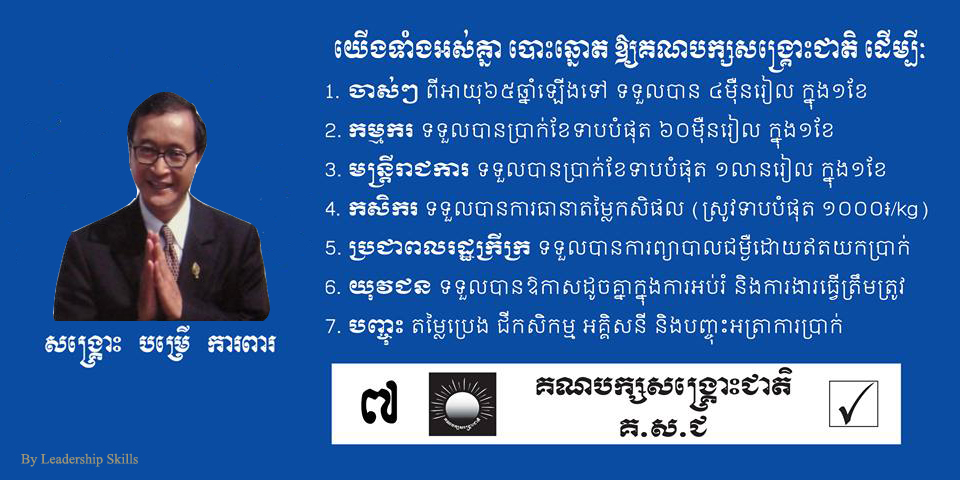July, 2013
now browsing by month
One day updating of the online vote 28 July 2013
Have you voted? If not yet, please try to exercise your rights to vote ONLINE VOTE CAMPAIGN here before the actual voting day on 28 July 2013 arrives. As this is a demonstration, the preliminary result for the first day is following:
Note that voters from Phnom Penh are more than 14% and we have seen voters from every Election Constituency throughout Cambodia voted. Please, stay tune on the vote result announcement on a frequent basis. Thank you very much for kind participation.
Please, don’t forget to caste your vote online here: ONLINE VOTE CAMPAIGN
Posted in Leadership, Politics | Comments Off on One day updating of the online vote 28 July 2013
Tags: Cambodia election, Election Watch, Online Vote
U.S.-Cambodia Relations: Issues for the 113th Congress
Summary
The United States and the Kingdom of Cambodia have been expanding their once-limited ties for a number of years, although U.S. concerns about Cambodia’s human rights record still limit the scope of the bilateral relationship. The Obama Administration has taken steps to broaden engagement with Cambodia, partly in response to China’s growing diplomatic and economic influence in Cambodia and the Lower Mekong Delta region. U.S. interests in Cambodia include promoting development, trade and investment, regional security, civil society, democracy, and
human rights. U.S. military engagement with Cambodia has increased as well. These include naval port visits, military assistance, and joint exercises related to international peacekeeping, humanitarian activities, and maritime security. A key challenge for U.S. policy toward Cambodia lies in balancing efforts to engage the Kingdom on many fronts while promoting democracy and
human rights.During the past decade, the Kingdom has made fitful progress in some areas of U.S. concern, including the conduct of elections, the development of civil society, labor rights, bringing some Khmer Rouge leaders to justice, public health, and counterterrorism measures. However, during
the past several years, the political system has become less democratic and civil liberties have been curtailed. Although political opposition groups may gain parliamentary seats in the upcoming July 2013 national elections by forming a united front and tapping into voter discontent among urban and marginalized groups, Prime Minister Hun Sen’s continued hold on power seems assured.Over the past decade and a half, Hun Sen has bolstered his political strength through a combination of electoral victories, influence over the broadcast media and judiciary, legal and extra-legal political maneuvers, intimidation of opponents and critics, patronage, and economic
threats. Some observers believe that the fairness of the upcoming national elections has already been seriously weakened. Among the major concerns are the prohibition of opposition leader Sam Rainsy from running in the election, the expulsion of opposition lawmakers from the National
Assembly, inaccurate voter lists, and the alleged lack of neutrality of the National Election Commission.The United States provides significant foreign aid to Cambodia, one of the poorest countries in Asia, largely through non-governmental organizations. The Kingdom received $76 million in U.S. assistance in FY2012. Program areas include public health, agricultural development,
environmental preservation, military training, maritime security, elections, civil society, and removal of explosive remnants of war. The United States is the largest foreign market for Cambodian goods, buying about half of the Kingdom’s garment exports.China has been a principal source of loans, infrastructure development, investment, and foreign aid to the Kingdom. Some experts maintain that Chinese assistance has significantly reduced the effectiveness of traditional aid donors in attempting to pressure Phnom Penh to make advances in the areas of rule of law, democracy, and human rights. Some groups have expressed concerns
about the adverse effects of China’s development projects on the local environment. Other observers also contend that Beijing has influenced Cambodian foreign policy. During its
chairmanship of the Association of Southeast Asian Nations (ASEAN) in 2012, Cambodia was seen as acceding to Beijing’s desire to block attempts to raise the issue of maritime security in regional fora, to the consternation of the United States and other ASEAN nations.
Read the whole report: US-Cambodia Relations_Issues for the 113th Congress
Posted in Leadership, Politics, Social | Comments Off on U.S.-Cambodia Relations: Issues for the 113th Congress
សូមចូលរួមបោះឆ្នោត Please Vote
អ្នកអាចស្វែងយល់ពីគោលនយោបាយ ប្រវតិ្តមេដឹកនាំ និងប្រវត្តិគណបក្សធំៗទាំងពីនេះតាមគេហទំព័រខាងក្រោម។
You can learn about the policy, background of their key leaders and history of these two large parties through the links below.
Cambodia National Rescue Party (CNRP)
Cambodian People’s Party (CPP)
Note: The list name is alphabetically posted (a to z)
Posted in Leadership, Politics, Social | Comments Off on សូមចូលរួមបោះឆ្នោត Please Vote
Tags: Cambodia election, Election Watch, Vote Together
CAMBODIA: Understanding nation building
AHRC-ETC-025-2013
July 2, 2013
They may look simple, but each stage requires considerable knowledge and understanding, and all five stages are interrelated and provide a formidable vision of nation-building.
1. Identity: People must think of themselves first and foremost as citizens of the nation; original identification with a tribe, region, or subnational group must cease.
2. Legitimacy: A government becomes legitimate and its rule becomes rightful when its citizens respect it, obey its laws and commands, and keep it in power.
3. Penetration: A government must reach out to all people everywhere on the land andget them to follow and obey its laws and commands.
4. Participation: People need to participate, or have a say, in the affairs of the state and intheir government.
5. Distribution: Who gets what, when, how.
Posted in Culture, Leadership, Politics, Social | Comments Off on CAMBODIA: Understanding nation building
Tags: A.Peang-Meth















